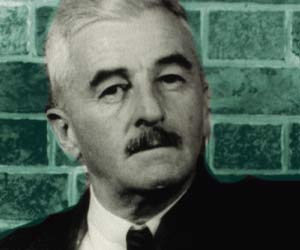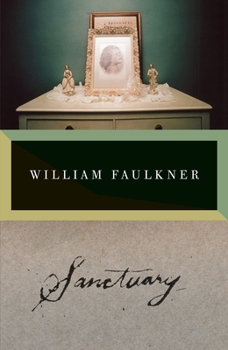Sanctuary
Select Format
Select Condition 
Book Overview
A powerful novel examining the nature of evil, informed by the works of T. S. Eliot and Freud, mythology, local lore, and hardboiled detective fiction. Sanctuary is the dark, at times brutal, story of the kidnapping of Mississippi debutante Temple Drake, who introduces her own form of venality into the Memphis underworld where she is being held.
Format:Paperback
Language:English
ISBN:0679748148
ISBN13:9780679748144
Release Date:December 1993
Publisher:Vintage
Length:336 Pages
Weight:0.61 lbs.
Dimensions:0.7" x 5.3" x 8.0"
Customer Reviews
5 ratings
A "terrible" book, but "a great novel"
Published by Thriftbooks.com User , 18 years ago
For many readers, "Sanctuary" doesn't seem to fit into Faulkner's canon. Although the prose is recognizably his, the tone and subject matter seem more appropriate to the genre of pulp fiction--closer to Hammett than to O'Connor. And, for the time it was published, it is shockingly gruesome and graphic. (Arnold Bennett said that it was a "terrible" book and "a great novel.") Once you figure out who everyone is and what's going on, however, it's an unlikely page-turner. Faulkner presents his tale not simply as a mystery but as a puzzle of characters who can barely figure out their own roles and who challenge the reader to sort out their stories The central plot revolves around Temple Drake, a well-off, fast-living college student who gets wowed by Gowan Stevens, a handsome young alcoholic who takes her to the inaccessible estate of a backwoods bootlegger. Gowan soon passes out, and the traumatized Temple suddenly understands she is stuck in a situation from which she can't easily extract herself--and her circumstances worsen when Gowan abandons her to the gangsters and drunks bumming around the house. Even though it was published after "As I Lay Dying," which he completed at the end of 1929, "Sanctuary" could be considered Faulkner's fifth novel rather than his sixth. Earlier that year, he sent the manuscript for "Sanctuary" to his publisher. It seems likely he had been toying with it in some form for quite a while, since at least one passage has been found in his papers with a date of 1925. There are a number of colorful tales surrounding the history of this book's publication--some of them possibly apocryphal and probably invented by Faulkner himself. (A fuller accounting can be found in Joseph Blotner's invaluable biography of Faulkner.) Faulkner later wrote that he "invented the most horrific tale I could imagine," and he claimed that his publisher told him after reading it, "Good God, I can't publish this. We'd both be in jail." Whatever the reason for the delay, the publisher changed his mind and--to Faulkner's surprise--ultimately set the book into galleys. The interval of nearly two years convinced Faulkner that the book couldn't be published in its current form, so he heavily revised and rearranged the book in proof. Faulkner also claimed that he "began to think of books in terms of possible money." Although the book did indeed sell well--better than any of his books until "The Wild Palms"--some scholars contend that Faulkner is being somewhat coy about his motives for writing this particular book. (Reading his correspondence, one gets the impression that that he was always writing with an eye towards his financial situation.) So how is it? The easy answer is that "Sanctuary" is not "Sound and the Fury," "As I Lay Dying," or "Light in August." But judged as a piece of noir, I think it's as good as the best Depression-era crime novels. As in many of Faulkner's other books, the story leaps back and forth across time, and often the sam
Another Great Faulkner Tale
Published by Thriftbooks.com User , 19 years ago
In SANCTUARY-- an ironic title if there ever was one-- we see what happens when a genius writes a potboiler. We have one terrific roller coaster ride. Faulkner said he wrote this novel to make money after the disappointing sales of THE SOUND AND THE FURY and AS I LAY DYING. About SANCTUARY, published in 1931, he wrote: "I began to think of books in terms of possible money. . . . I took a little time out, and speculated what a person in Mississippi would believe to be current trends, chose what I thought was the right answer and invented the most horrific tale I could imagine. . ." This novel was the biggest seller of all Faulkner's works during his lifetime. We are introduced to a whole slew of unforgettable characters: Temple Drake, the seventeen-year-old daughter of a local judge; the monster Popeye; Gowan, the frat-boy drunk who "learned" to handle his alcohol while a student in Virginia; the tragic Ruby; Miss Reba, the Memphis madam; the obnoxious Senator Snopes; Horace Benbow, et al. In the hands of a lesser writer, some of these people would have become stereotypes. Instead we have a remarkable and tragic story of small town justice where a man is convicted for who is is, rather than what he is accused of doing. Horace Benbow, an attorney who reads books, is the moral center of the novel who believes that sometimes a man "might do something just because he knew it was right, necessary to the harmony of things that it be done." Unlike many of Faulkner's more difficult works, SANCTUARY is a very straight-forward novel-- an easy but fascinating read. As always, Faulkner's language can be beautifully descriptive: "When he waked a narrow rosy pencil of sunlight fell level through the window." And "Within the black-and-silver tunnel of cedars fireflies drifted in fatuous pinpricks." He is also razor-sharp with his use of colloquial language. At one point Virgil Snopes says, "Look and see if they taken anything of yourn." Virgil and his brother Fonzo provide some much-needed humor in this rather horrific tale. They, young hick barber students, check into a house of ill repute in Memphis, thinking it is an ordinary hotel and then go to another "whorehouse" for their own earthly delights. While SANCTUARY is certainly not THE SOUND AND THE FURY, it is a necessary read for Faulkner lovers.
She sells Sanctuary
Published by Thriftbooks.com User , 22 years ago
Imagine it's 1929 and you're reading a book about bootlegging, couples living in sin, rape, whorehouses, with near-explicit sex scenes. Faulkner's SANCTUARY must have been mind-blowing to the genteel masses. They were reading material that they still don't show on network television today, in an age where such things are so commonly discussed in the media that we hardly look sideways at it. This book must have arrived like an explosion, shaking the sensibilities of readers everywhere, daring booksellers to put it on their shelves.SANCTUARY is not an easy book. You'll find yourself, if you're like me, rereading passages to understand exactly what's going on. The characters, though precisely described, can be difficult to picture in your mind, especially as we move further away from the Jazz Age, with its unusual expressions, costume, and mores. Imagine Tennessee and Mississippi when cars were relatively new to the roads, when the various social strata -- some wearing suits, some overalls -- began mixing together more easily. Imagine being a teenage girl acting as a woman trapped in a moonshiner's shack, far away from the protection of her home, encountering men like creatures in a horrific play who drink liquor and watch her lie under the covers, her only protector passed out beside her.Faulkner's reintroduced introduction is a godsend that will help you decipher the book somewhat. The editor's notes at the end of the book will help you understand much of the jargon and the motivation of the characters.A good read in any age.
A Novel Master
Published by Thriftbooks.com User , 23 years ago
William Faulkner stands in my mind with only a few authors whose writing does not seem like writing. His novels seem more moments of real life. While I was reading "Sanctuary" you forget you are reading a book and the characters take on a virtual reality in your mind. Like all of Faulkner's books, this one is disorienting at first, simply by the author's strength of vision. The main plot revolves around Temple Drake, a coquettish college girl who likes to secretly sneak out of her college dorm to attend dances. One of her rides back from one of these dances is a boy named Gowan Stevens. He decides to stop off at an illegal moonshine operation and promptly sets about getting drunk. Temple is trapped at the house surrounded by all sorts of shady characters you would associate with such an operation. One of these is named Popeye, and trust me he is not a hero, he rapes Temple. One of the things I found slightly disturbing was the sense that Temple is a flirt and you get the sense that Faulkner felt that eventually some sex crime was going to be committed against her. She could get away with things around college boys but she fails to realize that with criminals, its a very bad move. It's the beginning of her great moral slide that was always just waiting to happen. There are other subplots going on around it. The owner of the moonshine operation is a convict and his wife supported herself through prostitution while he was in the joint, which is a source of tension between them. Horace Benbow is a lawyer who has left his wife simply because he recognizes the hollowness of his marriage. These characters are connected by the crime against Temple. The depressing thing about this novel is that noone really gets a sanctuary. The ending is not pretty. That's what makes it so powerful and so real. This book is right up there with Shakespeare and Dostoyevsky in sheer power of vision.
Darkness, American Stlye
Published by Thriftbooks.com User , 25 years ago
While _Heart Of Darkness_ portrays the bleakness of the unchecked human spirit, it is Faulkner's _Sanctuary_ that places it squarely in our noses, our ears, our eyes as well as our hearts and souls. In this purely American novel we see not "adventurers" in Conrad's traditional sense, but American debutantes causually thrust into the orbit of the Memphis Prohibition underworld. As in _Sound and the Fury_ Faulkner uses his "shadow of the branch" approach to the narrative keeping the reader guessing as to what actually takes place at the "Frenchman's Place"; and when the reader finally "gets it" -- or, more accurately -- when this reader "got it," the experience was as shocking as anything to be seen in Doestoyevsky, Conrad or Bauldelaire. I wrote my thesis on this work five years ago and its effect on me, as I flippantly spew these remarks are as vivid as the first time I encountered Popeye with his face like "tin," and Temple Drake.Highly recommended for those not afraid of impingement, because _Sanctuary_ will impinge on whatever the reader's threshold for true darkness and horror may be.
Sanctuary Mentions in Our Blog

Embracing Faulkner
Published by William Shelton • September 26, 2020
When he was in college, our Regional Director William Shelton was told his writing was like Faulkner! And he…recoiled in disdain. For Faulkner newcomers and fans alike, William’s experience learning to appreciate the classic author gives a great understanding of why Faulkner has made such an impact.






